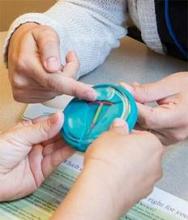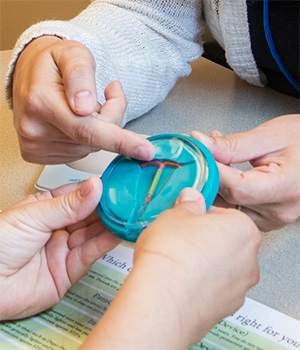User login
Two long-acting reversible contraceptive devices remained highly effective for about a year beyond their approved durations of use, according to the preliminary results of a study of 500 women.
In the Effectiveness of Prolonged use of IUD/Implant for Contraception (EPIC) study, researchers from Washington University in St. Louis followed women who were continuing their use of two long-acting contraceptive devices beyond the durations approved by the Food and Drug Administration.
Among 237 women who used the etonogestrel implant for a median of 12.5 months beyond the FDA-approved duration of 3 years, there were no unintended pregnancies. There was one unintended pregnancy among the 263 women who used the 52-mg levonorgestrel IUD for a median of 11.7 months beyond the 5-year duration approved by the FDA, the researchers wrote Feb. 5 in Obstetrics & Gynecology (2015;125:599-604).
“The longer a contraceptive method is effective, the bigger the impact it can have,” Dr. Jeffrey F. Peipert, professor of obstetrics and gynecology at Washington University, and the senior researcher on the study, said in a statement. “In the long term, this work has the potential to change how we provide contraceptive methods around the world and can enable women to control their reproductive health and family size.”The study is ongoing, and the researchers are seeking to enroll 400 women in each comparison group, they wrote. The interim analysis included 237 women who used the implant for a total of 229.4 woman-years, and 263 women who used the IUD for 197.7 years.
Etonogestrel levels did not vary with body mass index, and median levels of the hormone consistently exceeded those needed to suppress ovulation. The woman who became pregnant presented with pregnancy symptoms less than 1 month after the FDA-approved duration of use had expired. On examination, she had a partially expelled IUD with the stem visible outside the cervix, the researchers wrote.
The research was supported by the Society of Family Planning, the National Center for Advancing Translational Sciences, and the National Institutes of Health. The study’s senior researcher, Dr. Peipert, reported receiving research support from Bayer, Teva, and Merck, and serving on advisory boards for Teva, Bayer, and Watson/Activitis. The other researchers reporting having no financial disclosures.
Two long-acting reversible contraceptive devices remained highly effective for about a year beyond their approved durations of use, according to the preliminary results of a study of 500 women.
In the Effectiveness of Prolonged use of IUD/Implant for Contraception (EPIC) study, researchers from Washington University in St. Louis followed women who were continuing their use of two long-acting contraceptive devices beyond the durations approved by the Food and Drug Administration.
Among 237 women who used the etonogestrel implant for a median of 12.5 months beyond the FDA-approved duration of 3 years, there were no unintended pregnancies. There was one unintended pregnancy among the 263 women who used the 52-mg levonorgestrel IUD for a median of 11.7 months beyond the 5-year duration approved by the FDA, the researchers wrote Feb. 5 in Obstetrics & Gynecology (2015;125:599-604).
“The longer a contraceptive method is effective, the bigger the impact it can have,” Dr. Jeffrey F. Peipert, professor of obstetrics and gynecology at Washington University, and the senior researcher on the study, said in a statement. “In the long term, this work has the potential to change how we provide contraceptive methods around the world and can enable women to control their reproductive health and family size.”The study is ongoing, and the researchers are seeking to enroll 400 women in each comparison group, they wrote. The interim analysis included 237 women who used the implant for a total of 229.4 woman-years, and 263 women who used the IUD for 197.7 years.
Etonogestrel levels did not vary with body mass index, and median levels of the hormone consistently exceeded those needed to suppress ovulation. The woman who became pregnant presented with pregnancy symptoms less than 1 month after the FDA-approved duration of use had expired. On examination, she had a partially expelled IUD with the stem visible outside the cervix, the researchers wrote.
The research was supported by the Society of Family Planning, the National Center for Advancing Translational Sciences, and the National Institutes of Health. The study’s senior researcher, Dr. Peipert, reported receiving research support from Bayer, Teva, and Merck, and serving on advisory boards for Teva, Bayer, and Watson/Activitis. The other researchers reporting having no financial disclosures.
Two long-acting reversible contraceptive devices remained highly effective for about a year beyond their approved durations of use, according to the preliminary results of a study of 500 women.
In the Effectiveness of Prolonged use of IUD/Implant for Contraception (EPIC) study, researchers from Washington University in St. Louis followed women who were continuing their use of two long-acting contraceptive devices beyond the durations approved by the Food and Drug Administration.
Among 237 women who used the etonogestrel implant for a median of 12.5 months beyond the FDA-approved duration of 3 years, there were no unintended pregnancies. There was one unintended pregnancy among the 263 women who used the 52-mg levonorgestrel IUD for a median of 11.7 months beyond the 5-year duration approved by the FDA, the researchers wrote Feb. 5 in Obstetrics & Gynecology (2015;125:599-604).
“The longer a contraceptive method is effective, the bigger the impact it can have,” Dr. Jeffrey F. Peipert, professor of obstetrics and gynecology at Washington University, and the senior researcher on the study, said in a statement. “In the long term, this work has the potential to change how we provide contraceptive methods around the world and can enable women to control their reproductive health and family size.”The study is ongoing, and the researchers are seeking to enroll 400 women in each comparison group, they wrote. The interim analysis included 237 women who used the implant for a total of 229.4 woman-years, and 263 women who used the IUD for 197.7 years.
Etonogestrel levels did not vary with body mass index, and median levels of the hormone consistently exceeded those needed to suppress ovulation. The woman who became pregnant presented with pregnancy symptoms less than 1 month after the FDA-approved duration of use had expired. On examination, she had a partially expelled IUD with the stem visible outside the cervix, the researchers wrote.
The research was supported by the Society of Family Planning, the National Center for Advancing Translational Sciences, and the National Institutes of Health. The study’s senior researcher, Dr. Peipert, reported receiving research support from Bayer, Teva, and Merck, and serving on advisory boards for Teva, Bayer, and Watson/Activitis. The other researchers reporting having no financial disclosures.
Key clinical point: The etonogestrel implant and the 52-mg levonorgestrel intrauterine device were safe and effective for a year beyond their FDA-approved durations of use.
Major finding: None of the women who used the implant, and only one who used the IUD, reported unintended pregnancies.
Data source: Prospective, observational study of 237 women who used the implant and 263 who used the IUD beyond the FDA-approved durations of use.
Disclosures: The research was supported by the Society of Family Planning, the National Center for Advancing Translational Sciences, and the National Institutes of Health. The senior researcher, Dr. Peipert, reported receiving research support from Bayer, Teva, and Merck, and serving on advisory boards for Teva, Bayer, and Watson/Activitis. The other researchers reported having no financial disclosures.

